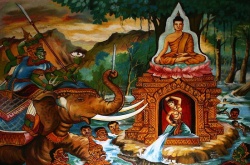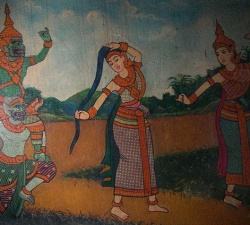Difference between revisions of "Phra Mae Thorani"
(Created page with "thumb|250px| <poem> '''Phra Mae Thorani''' (Thai: พระแม่ธรณี), Mae Phra Thorani (Thai: แม่พระธรณี) or...") |
|||
| (2 intermediate revisions by the same user not shown) | |||
| Line 1: | Line 1: | ||
[[File:Battle_with_Mara.jpg|thumb|250px|]] | [[File:Battle_with_Mara.jpg|thumb|250px|]] | ||
<poem> | <poem> | ||
| − | '''Phra Mae Thorani''' (Thai: พระแม่ธรณี), Mae Phra Thorani (Thai: แม่พระธรณี) or Nang Thorani (นางธรณี), known as Wathondara (ဝသုန္ဒရာ) or Wathondare (ဝသုန္ဒရေ) in Burmese, from Pali Vasudhara[n 1]) are Thai and Lao language names for the Khmer language Preah Thorani, an earth goddess of the Buddhist mythology of the region. She is also known as Suvathara or Sowathara. | + | '''[[Phra Mae Thorani]]''' ([[Thai]]: [[พระแม่ธรณี]]), [[Mae Phra Thorani]] ([[Thai]]: [[แม่พระธรณี]]) or [[Nang Thorani]] ([[นางธรณี]]), known as [[Wathondara]] (ဝသုန္ဒရာ) or [[Wathondare]] (ဝသုန္ဒရေ) in [[Burmese]], from [[Pali]] [[Vasudhara]][n 1]) are [[Thai]] and [[Lao language]] names for the [[Khmer language]] [[Preah Thorani]], an [[earth goddess]] of the [[Buddhist mythology]] of the region. She is also known as [[Suvathara]] or [[Sowathara]]. |
| − | Etymology | + | {{Wiki|Etymology}} |
| − | The word "Thorani" is the Royal Thai General System of Transcription romanization of "dharaṇī", a loanword from Pali and Sanskrit for ground, earth | + | The [[word]] "[[Thorani]]" is the {{Wiki|Royal}} [[Thai]] General System of Transcription romanization of "[[dharaṇī]]", a loanword from [[Pali]] and [[Sanskrit]] for ground, [[earth]] and [[Phra]], from the [[Pali]] 'Vara' and the [[Thai]] 'Mae' (mother). |
| − | |||
| − | |||
| − | + | [[Iconography]] and symbology. | |
| − | |||
| − | Calling the earth to witness | + | |
| + | Images of [[Phra Mae Thorani]] are common in [[shrines]] and [[Buddhist temples]] of [[Burma]], [[Cambodia]], [[Thailand]] and [[Laos]]. According to [[Buddhist]] [[myths]] [[Phra Mae Thorani]] is personified as a young woman wringing the cool waters of [[detachment]] out of her [[hair]], to drown [[Mara]], the {{Wiki|demon}} sent to tempt the [[Buddha]] as he [[meditated]] under the [[bodhi tree]]. | ||
| + | |||
| + | In [[temple murals]] [[Phra Mae Thorani]] is often depicted with the [[Buddha]] in the [[posture]] of [[Calling the earth to witness]]. | ||
| + | |||
| + | The waters flowing forth from her long [[hair]] wash away the armies of [[Mara]] and [[symbolize]] the [[water]] of the [[bodhisattva's]] [[perfection of generosity]] ([[dana parami]]). | ||
| + | |||
| + | “ 'The [[Bodhisattva]] was sitting in [[meditation]] on his [[throne]] under the [[Bodhi Tree]], [[Mara, the Evil One]], was [[jealous]] and wanted to stop him from reaching [[enlightenment]]. | ||
| + | |||
| + | Accompanied by his [[warriors]], wild [[animals]] and his daughters, he tried to drive the [[Bodhisattva]] from his [[throne]]. All the [[gods]] were terrified and ran away, leaving the [[Bodhisattva]] alone to face [[Mara's]] challenge. | ||
| + | |||
| + | The [[Bodhisattva]] stretched down his right hand and touched the [[earth]], summoning her to be his {{Wiki|witness}}. | ||
| + | |||
| + | The [[earth]] [[deity]] in the [[form]] of a beautiful woman rose up from underneath the [[throne]], and [[affirmed]] the [[Bodhisattva's]] right to occupy the [[vajriisana]]. | ||
| + | |||
| + | She twisted her long [[hair]], and torrents of [[water]] collected there from the {{Wiki|innumerable}} donative libations of the [[Buddha]] over the ages created a flood. The flood washed away [[Mara]] and his {{Wiki|army}}, and the [[Bodhisattva]] was freed to reach [[enlightenment]].[4] | ||
| + | |||
| + | Calling the [[earth]] to {{Wiki|witness}} | ||
[[File:Phra_Mae_Thorani_847.jpg|thumb|250px|]] | [[File:Phra_Mae_Thorani_847.jpg|thumb|250px|]] | ||
| − | In the Iconography of Gautama Buddha in Laos and Thailand, "Touching the earth" refers to the Buddha's pointing towards the earth, to summon the Earth Goddess to come to his assistance in obtaining enlightenment, by witnessing to his past good deeds.[ | + | In the [[Iconography]] of [[Gautama Buddha]] in [[Laos]] and [[Thailand]], "[[Touching]] the [[earth]]" refers to the [[Buddha's]] pointing towards the [[earth]], to summon the [[Earth Goddess]] to come to his assistance in obtaining [[enlightenment]], by witnessing to his {{Wiki|past}} [[good deeds]]. |
| − | Phra Mae Thorani fountain in Bangkok | + | |
| − | Buddhist water libation | + | [[Phra Mae Thorani]] fountain in {{Wiki|Bangkok}} |
| − | Photograph of a libation ceremony in 1900. | + | |
| + | [[Buddhist]] [[water]] libation | ||
| + | |||
| + | Photograph of a libation {{Wiki|ceremony}} in 1900. | ||
| + | |||
| + | In [[Burmese]] [[Buddhism]], the [[water]] libation {{Wiki|ceremony}}, called (yay zet cha), which involves the {{Wiki|ceremonial}} pouring of [[water]] from a glass into a [[vase]], drop by drop, concludes most [[Buddhist ceremonies]] [[including]] donation {{Wiki|celebrations}} and feasts. | ||
| + | |||
| + | This {{Wiki|ceremonial}} libation is done to share the accrued [[merit]] with all other [[living beings]] in all [[31 planes of existence]].[6] While the [[water]] is poured, a {{Wiki|confession}} of [[faith]], called the hsu taung imaya dhammanu, is recited and led by the [[monks]]. | ||
| + | |||
| + | Then, the [[merit]] is distributed by the donors, called ahmya wei by saying Ahmya ahmya ahmya yu daw mu [[gya]] ba gon law three times, with the audience responding thadu, [[Pali]] for "well done." | ||
| + | |||
| + | The [[earth goddess]] [[Vasudhara]] is invoked to {{Wiki|witness}} these [[meritorious]] [[deeds]].[7] Afterward, the libated [[water]] is poured on soil outside, to return the [[water]] to [[Vasudhara]]. | ||
| + | {{Wiki|Modern}} use as a [[symbol]] | ||
| − | + | [[Phra Mae Thorani]] is featured in the logo of: | |
| − | |||
| − | + | The {{Wiki|Bangkok}} Metropolitan Waterworks Authority. | |
| − | + | The Democrat Party ([[Thailand]]) to emphasise the importance of [[earth]] and [[water]] for [[Thailand]], together with the [[Pali]] proverb sachamwe amatta wacha (สจฺจํเว อมตา วาจา) "[[truth]] is indeed the undying [[word]]," to symbolise the values of the Party. | |
| − | The Democrat Party (Thailand) to emphasise the importance of earth and water for Thailand, together with the Pali proverb sachamwe amatta wacha (สจฺจํเว อมตา วาจา) "truth is indeed the undying word," to symbolise the values of the Party. | ||
| − | Mae Thorani may also appear as a decorative element of Thai folklore. | + | [[Mae Thorani]] may also appear as a decorative [[element]] of [[Thai]] [[folklore]]. |
</poem> | </poem> | ||
{{W}} | {{W}} | ||
[[Category:Vasudhara]] | [[Category:Vasudhara]] | ||
Latest revision as of 17:31, 25 January 2016
Phra Mae Thorani (Thai: พระแม่ธรณี), Mae Phra Thorani (Thai: แม่พระธรณี) or Nang Thorani (นางธรณี), known as Wathondara (ဝသုန္ဒရာ) or Wathondare (ဝသုန္ဒရေ) in Burmese, from Pali Vasudhara[n 1]) are Thai and Lao language names for the Khmer language Preah Thorani, an earth goddess of the Buddhist mythology of the region. She is also known as Suvathara or Sowathara.
Etymology
The word "Thorani" is the Royal Thai General System of Transcription romanization of "dharaṇī", a loanword from Pali and Sanskrit for ground, earth and Phra, from the Pali 'Vara' and the Thai 'Mae' (mother).
Iconography and symbology.
Images of Phra Mae Thorani are common in shrines and Buddhist temples of Burma, Cambodia, Thailand and Laos. According to Buddhist myths Phra Mae Thorani is personified as a young woman wringing the cool waters of detachment out of her hair, to drown Mara, the demon sent to tempt the Buddha as he meditated under the bodhi tree.
In temple murals Phra Mae Thorani is often depicted with the Buddha in the posture of Calling the earth to witness.
The waters flowing forth from her long hair wash away the armies of Mara and symbolize the water of the bodhisattva's perfection of generosity (dana parami).
“ 'The Bodhisattva was sitting in meditation on his throne under the Bodhi Tree, Mara, the Evil One, was jealous and wanted to stop him from reaching enlightenment.
Accompanied by his warriors, wild animals and his daughters, he tried to drive the Bodhisattva from his throne. All the gods were terrified and ran away, leaving the Bodhisattva alone to face Mara's challenge.
The Bodhisattva stretched down his right hand and touched the earth, summoning her to be his witness.
The earth deity in the form of a beautiful woman rose up from underneath the throne, and affirmed the Bodhisattva's right to occupy the vajriisana.
She twisted her long hair, and torrents of water collected there from the innumerable donative libations of the Buddha over the ages created a flood. The flood washed away Mara and his army, and the Bodhisattva was freed to reach enlightenment.[4]
Calling the earth to witness
In the Iconography of Gautama Buddha in Laos and Thailand, "Touching the earth" refers to the Buddha's pointing towards the earth, to summon the Earth Goddess to come to his assistance in obtaining enlightenment, by witnessing to his past good deeds.
Phra Mae Thorani fountain in Bangkok
Buddhist water libation
Photograph of a libation ceremony in 1900.
In Burmese Buddhism, the water libation ceremony, called (yay zet cha), which involves the ceremonial pouring of water from a glass into a vase, drop by drop, concludes most Buddhist ceremonies including donation celebrations and feasts.
This ceremonial libation is done to share the accrued merit with all other living beings in all 31 planes of existence.[6] While the water is poured, a confession of faith, called the hsu taung imaya dhammanu, is recited and led by the monks.
Then, the merit is distributed by the donors, called ahmya wei by saying Ahmya ahmya ahmya yu daw mu gya ba gon law three times, with the audience responding thadu, Pali for "well done."
The earth goddess Vasudhara is invoked to witness these meritorious deeds.[7] Afterward, the libated water is poured on soil outside, to return the water to Vasudhara.
Modern use as a symbol
Phra Mae Thorani is featured in the logo of:
The Bangkok Metropolitan Waterworks Authority.
The Democrat Party (Thailand) to emphasise the importance of earth and water for Thailand, together with the Pali proverb sachamwe amatta wacha (สจฺจํเว อมตา วาจา) "truth is indeed the undying word," to symbolise the values of the Party.
Mae Thorani may also appear as a decorative element of Thai folklore.

